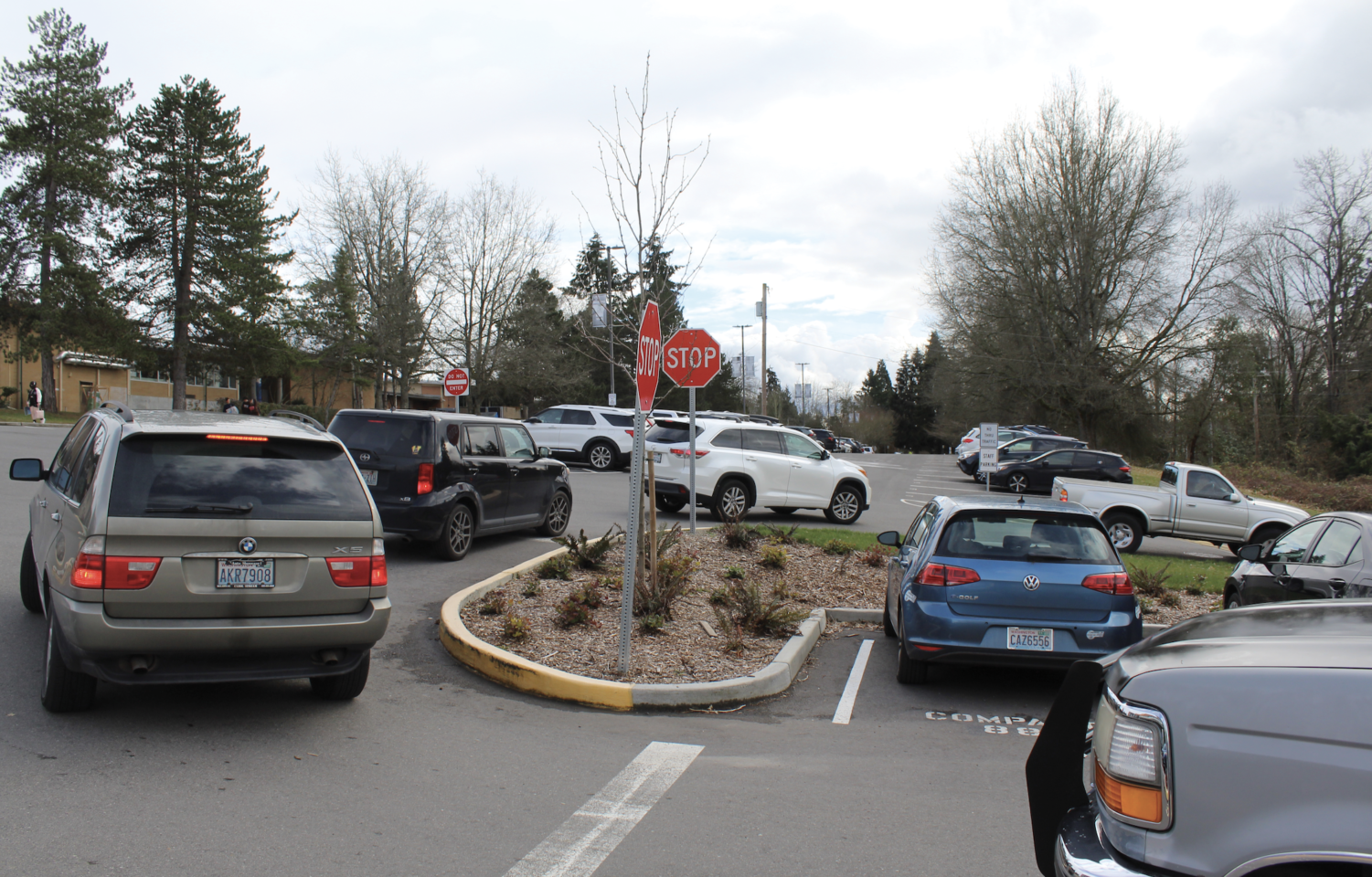At Inglemoor, there are currently only 369 parking spots, which is insufficient considering there are around 800 juniors and seniors eligible to apply for parking passes. Cars have to be registered and must display a pass showing the students’ assigned spots. Cars that aren’t registered or that are parked outside of their spots will occasionally get ticketed.
Even if a student parks in their assigned spot and has their car registered, if their pass isn’t visible in the car, they may still face consequences. Some students believe these rules are too strict and in some cases, unnecessary. Even among the limited number of parking pass holders, there’s discontent with the way parking and driving at school is handled, especially when it comes to traffic, rules and tickets.
“It’s really hectic. I mean, I don’t have a seventh period, but last year — and I know people this year — they have a hard time getting out of the school and getting into the school. Sometimes I’ll be late just because I feel like we don’t have a good system of getting in and out. The light needs to be longer,” said senior Jordan Schenkien (he/him).
Although students have mixed opinions about the parking system, many still buy passes. The cost of parking passes has gone up this year to $50 for the whole year, compared to $45.41 last year. For a parking pass bought only for the second semester, the cost is $25, $2.29 more than last year. As of March, $18,375 has been collected from parking passes this school year, which is $6,318 more than last year. Despite the increased cost of the passes, many students have no choice but to purchase one because they live outside of bus zones or because of their schedule.
“I can’t really take the bus because I don’t have a first period. If I did, I would have just been sitting there for like an hour, which would have sucked,” said senior Kelli Dillender (she/her).
For some students with parking spots in the farthest back lot, the walk across campus can take more than five minutes, making it inconvenient and difficult for students to get to class on time. This issue caused senior Emberlee Weisler (she/her) to often park in other students’ spots in order to avoid a tardy.
However, after receiving tickets for this, she decided to instead take the tardy for arriving late to class rather than getting tickets for parking in a spot that isn’t hers.
“There’s so many empty spots every single day, all day. It’s like, what are they doing? Why can’t I just park there, especially because my first period is all the way across campus from my parking spot?” said Weisler. Despite some students choosing to break the rules and park in other students’ spots, campus supervisor Rick Calhoun (he/him) said that with the addition of parking supervisor Sarah Beeson (she/her) this year, the number of student complaints he’s received of students parking in others’ spots has decreased significantly from previous years. This is due to the increased parking supervision from Beeson; consequences to be handed out more frequently.
“I think it’s frustrating for some students who forget their passes, or don’t want to have the passes out, or want to park in the visitor lot or things like that. Probably can be a little more frustrating because they were able to get away with things in the past that they aren’t able to now,” said Calhoun.
Some students believe that consequences are being given too easily this year. As of March 7, 114 total tickets have been given out that haven’t been appealed.
“I get it because, obviously, you don’t want people parking in your spot. But at the same time, sometimes it’s not that serious,” said senior Ashleigh Sloan (she/her).
In comparison to last year, when tickets were only authorized to be given after spring break due to COVID-19, this year, tickets have been given out more harshly. For a student’s first violation, they receive a $10 ticket and a lunch detention, with the punishments progressively worsening. Students can get up to a $30 fine, after school detentions, and, if a student has four violations for the same offense, administrators will suspend their pass. The implementation of a fine alongside a lunch detention for tickets is new this year.
“The reason we decided to do both is because we found there was a certain amount of inequitability in the fact that some students, their parents just pay their fine, and they don’t really care, right? So, I’ve had kids that will rack up like $200 in fines, and the parents would pay for it. It doesn’t really do anything,” said Calhoun. “We have found that [detention] generally has been a bigger deterrent than the financial fines.”
This year, as of March 7, the school has collected $550 from parking tickets. According to Principal Adam Desautels (he/him), in accordance with Washington state law, revenue collected from both parking passes and tickets must be spent on maintaining the parking lot. The school’s goal is to neutralize the difference between the amount of money collected and the amount spent on parking, keeping the profit at $0. However, some students argue that they shouldn’t be expected to pay tickets given their limited financial resources and should be given the choice to just serve a lunch detention instead.
“I’m a student and there’s no way my parents are paying. I’m paying it with my work money, which I guess is adding to the punishment, but then to also have a lunch detention…I think it should be either a lunch detention or $10 all the time,” said Weisler.
Along with complaints about tickets, another thing some students find issues with is the campus speed limit, which is 5 mph. Desautels believes this number is sufficient considering students are walking near the lots. However, some students believe that it’s too slow, noting that they rarely follow that speed limit.
“I think it’s unnecessarily slow. Like, I can clearly see people coming because you don’t really have your view blocked by anything,” said Dillender.
However, the situation may soon take a turn for the better. Desautels, Calhoun and Beeson have all stated that they’re advocating for more parking spots to be constructed during the school’s redesign.
“We do want to open up parking. But when we open up parking, we need to also make sure we have a partnership with the city because we need to make sure the traffic flow in and out is better, right? It shouldn’t take you 30 minutes to be able to leave campus at the end of the day,” said Desautels.
Although some students find it hard to avoid complaining about parking, it’s important to keep in mind that as long as they follow the proper procedures and rules around parking, which they can find on Inglemoor’s website under Parking & Transportation, they’re unlikely to receive a ticket.
“I just think it’s important that people know that we’re trying. We’re trying to make sure that their money is going to preserve their spaces and what they want. And that we’re really trying to make the best of this situation when you sign up and follow the processes,” said Desautels.











